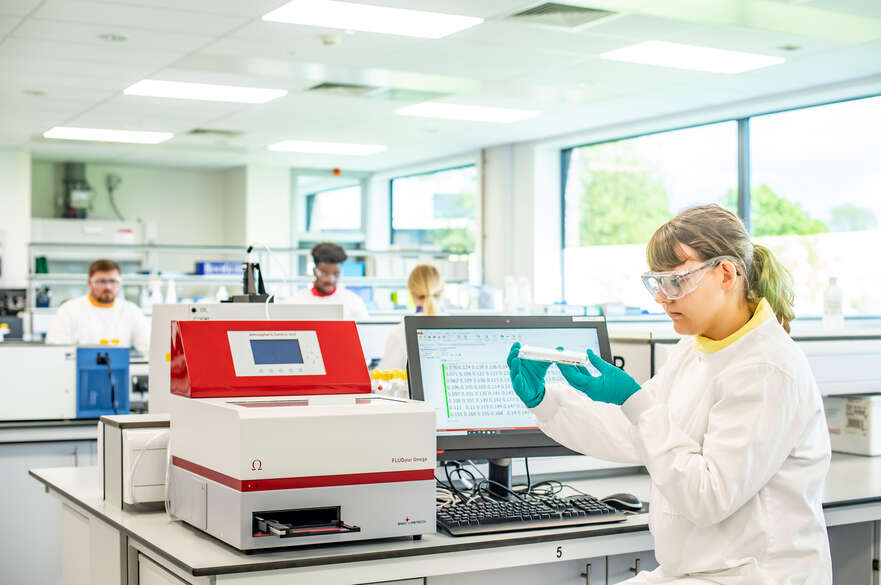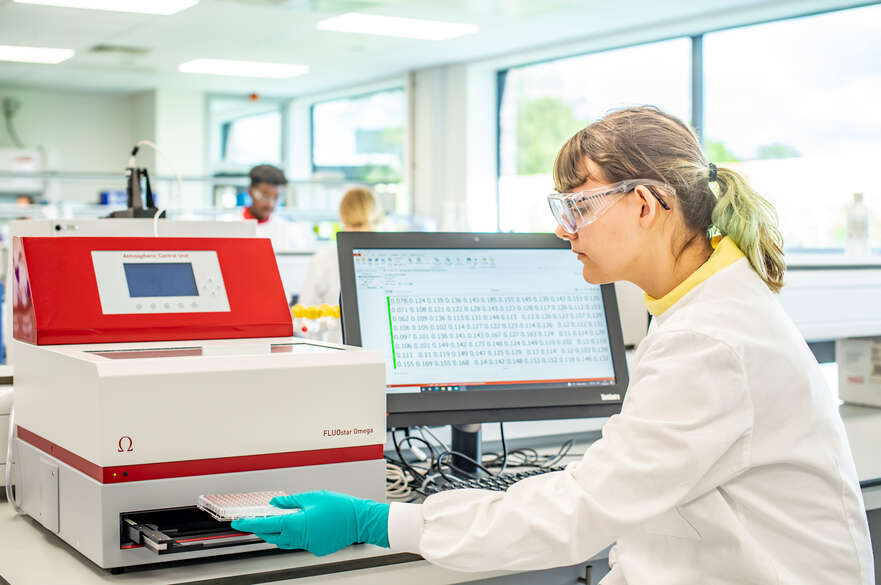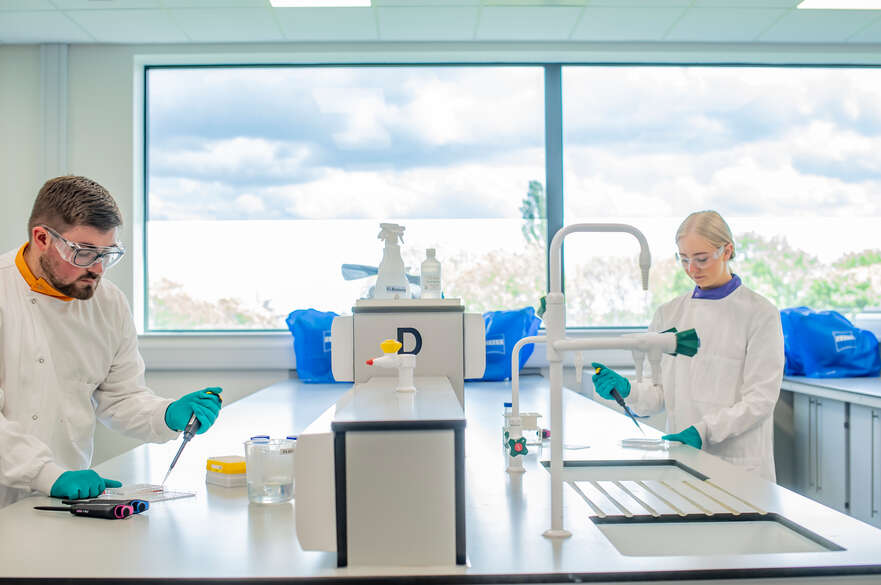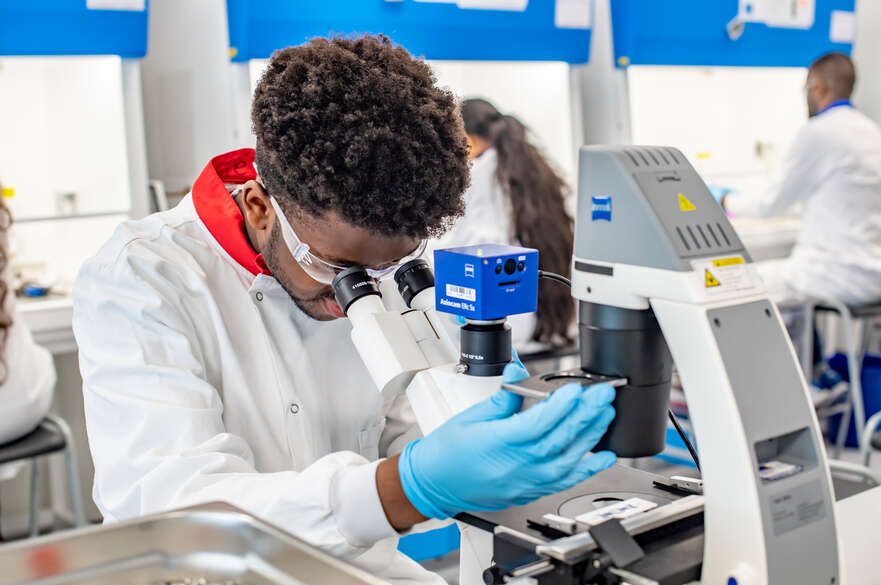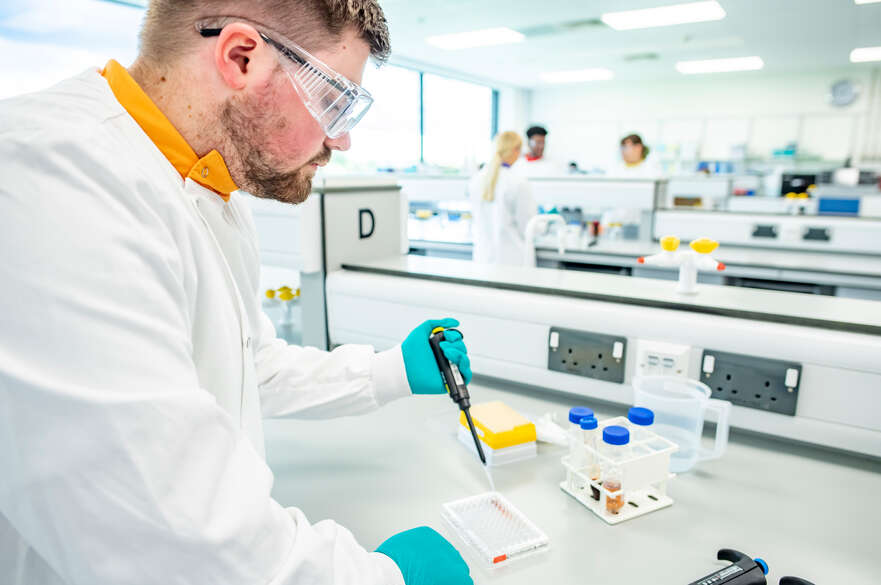Beat the Clearing queue
About this course
Just like pharmacologists in the workplace, the practical approaches you’ll be learning with us focus on the science of drugs and how they impact living systems and combat disease.
You’ll get a deep understanding of the drug discovery process, through industry guest lectures, including our very own NTU pharmacology alumni, and through practical classes that mirror assays performed in the pharmaceutical industry. As well as giving you loads of practical experience, you’ll get an extra qualification recognised by industry and backed by the UK Government to address the shortage of pharmacological expertise.
Why study BSc (Hons) Pharmacology at NTU?
Develop your portfolio
While at NTU you’ll create a skills portfolio in which you’ll showcase evidence of techniques and skills you’ve mastered. This portfolio allows you to document the development of your skills throughout your degree. They are a valuable tool when you graduate too, as they can be used to show future employers you are ready to work in a professional pharmacology environment.
Professional accreditation
The Royal Society of Biology have accredited this course. Accreditation is a seal of approval from professional bodies and our assurance to you that your degree is relevant and valued by industry.
Research-informed teaching
Our research is tackling real-world issues – and the people working on this research will be teaching you. During your final year research project you’ll get to work closely with a research-active member of staff. Your project will focus on a specific area within their research, so you’ll gain valuable experience. For example, Dr Zahraa Al-Ahmady, has been working using nanoparticles to deliver vital drugs to the brains of stroke patients.
During your final year research project, you’ll work closely with a member of staff, either on an aspect of their research or in their general area. You may be asked to help develop a new idea that can be incorporated into future research or help with our teaching. You’ll be working on real-world problems and gaining valuable experience at the same time.
Get industry experience
Through group work and the Introduction to Pharmacology module, you’ll start designing your own experiments and trying things out. Developing problem-solving skills by testing and learning are valuable graduate-level skills and we make sure you get this experience right from the start of your degree. The course has been designed to comply with the British Pharmacological Society guidelines so you’ll be developing the right skills and learning the theory needed to work in the pharmaceutical industry or in pharmacology research.
We’ve also embedded employability skills in your degree course, so you are not only learning theory and skills, but you know where to find your dream job and how to apply for it.
Take a work placement
Placements tell future employers you know how to do it as well as why. Our industry connections as well as the support you'll get from our Employability team all add up to a valuable work placement experience.
In Year Three, you’ll be encouraged to take a year-long placement overseas, or in the UK. You'll be supported throughout your placement year and will write a reflective report and diary during your placement. When you successfully complete your placement, you will be eligible to receive an additional award of a Diploma in Professional Practice.
Community and support
With support from your lecturers, personal tutors and technical staff, you can be sure we'll be here for you during your studies. Alongside your lectures and lab classes you’ll also have tutorial sessions. These are a chance to regularly meet in small groups with your personal tutor and members of your course to discuss the topics you are studying.
Got any feedback on your course? You’ll have lots of opportunities to discuss your course, for example in your tutorial sessions, with your course leader and course reps and you even have the chance to feedback on every module you study with an end-of-module survey. We love to hear your feedback and how we can make improvements. Following your feedback, we have recently added Professional Skills modules which are specific to the area of biosciences you are studying. We’ve also increased our support for your coursework assignments too, through drop-in sessions accessible when you need them most.
There’s support from your peers too. Our mentoring schemes give you support from other students on your course. Whether you need help with your studies or university life in general, they’ve been there and can give you a students’ perspective. Find out more about the support you’ll receive at NTU.
Meet our staff
Whether your interest is working in research or in the industry we have experienced teaching and technical staff who have close links with the pharmaceutical industry. This means you are learning the most relevant theory and techniques and their contacts help you find great placement opportunities and guest speakers. We also bring in guest lecturers (many of which are NTU Pharmacology graduates) to provide an industry perspective. They’ll be teaching you the latest thinking in pharmacology.
In your final year, you’ll work on an individual research project. You’ll work closely with a member of staff and your project will be linked to their research area. This means you’ll be getting a real experience of research in practice which will look great on your CV.
What you’ll study
You’ll learn how medicines as diverse as aspirin and penicillin work to cure or relieve common illnesses and diseases such as diabetes, cancer, asthma and Alzheimer’s Disease. This will be put into context by comparing it to the normal physiology of the human body. Drugs of abuse, both legal (e.g. alcohol) and illegal (e.g. cocaine and amphetamines) and their effects are studied you’ll also consider the legislation in place to control these substances. All material studied in this course is designed to comply with the British Pharmacological Society guidelines.
What our students say
The study of drugs has always appealed to me. When I heard about the Pharmacology course here I just knew I had to do it. Being able to gain first-hand experience in labs is a huge strength, which allows us to put theory into practice. I am now able to design my own experiments, use the laboratory equipment with precision, write lab reports, work independently and with other colleagues, and ultimately gain a fundamental science knowledge.
It's pretty exciting studying Pharmacology at NTU. Every day is a surprise, you always learn new things and new skills. The staff are amazing and very helpful.
Dexter Mwashita, BSc (Hons) Pharmacology
Study abroad opportunities
Get ready to embark on an adventure with our study abroad programs at partner universities or by getting a work placement overseas. Both opportunities will boost your employability, build lifelong friendships, and allow you to experience the world in a whole new way.
Introduction to Biochemistry
Study the key aspects of macromolecules, cell structure and function, and interrelationships in both practical and theoretical contexts.
Living Systems
Introduces levels of biological organisation from molecules to cells and ecosystems, providing a platform of knowledge and skills upon which other modules are developed.
Practical Techniques for Biology
Considers the principles of experimental design, data collection and analysis, including techniques in centrifugation, chromatography, electrophoresis, microscopy and radiobiology.
Genetics and Immunology
Develops genetic concepts and introduces basic aspects of the immune system, including the molecules, cells and interactions involved.
Introduction to Physiology
Introduces the physiology of human organ systems (respiratory, nervous, cardiovascular, urinary, endocrine and muscular) and examines the process of homeostasis.
Introduction to Pharmacology
Considers the principles of how drugs work, including factors that affect the magnitude of the response to drugs, specificity of drug action, drug interactions and side effects of drugs.
Core modules
Drugs of Addiction and Abuse
Develop an understanding of the use of drugs for non-medical purposes, including effects other than those desired by the users. It also introduces legislation controlling the use of substances.
Immunopharmacology
Considers disordered cellular and tissue physiology resulting from disease and drugs that can treat those diseases. You’ll develop an understanding of health and common illnesses.
Pathophysiology of Chronic Disease
You’ll look at the processes involved in maintaining normal physiology in renal, cardiovascular and nervous systems and how the same processes are affected by the disease.
Chemotherapy of Cancer and Infections
Explore the concept of selective toxicity as applicable to the treatment of cancer and infections. You’ll also consider the action of anti-cancer, anti-bacterial, anti-viral and anti-fungal drugs.
Professional Skills for Pharmacology
You’ll study, in detail the drug discovery process from identification and optimisation through to clinical development (trials) and regulatory approval. This will all be explored in the context of current trends in pharmacology such as genomics, ethics and immunotherapeutics.
Optional modules - One from:
Neuroscience
Explore the functions of the different brain regions and neuronal cell types, and relate these to higher brain activities and neuronal function.
Physiology
Develop concepts of physiological control systems and discover the link between changes in cellular and systemic function.
Optional year-long work placement. If you are not taking a placement, you will progress directly to your final year in year three.
Core modules
Clinical Pharmacology
Learn about drug development and the mode of action of selected drug types. You’ll also look at diseases of the human endocrine system and the advances in cellular and molecular techniques.
Current Topics in Pharmacology
Study recent advances and developments in pharmacology and the research techniques used to study molecular pharmacology.
Toxicology
Considers sources, types and mechanisms of action of selected natural and synthetic toxic chemicals. It also covers how toxicity can be assessed.
Research Project
Develop your skills as an independent researcher by completing a 40 credit point research project under the supervision of one of our academic staff, in an area of their expertise.
Optional modules - one from:
Current Topics in Neuroscience
Discusses current hot topics in molecular and cellular neuroscience, including learning and memory, stem cells, and the molecular basis of certain human neurological and psychiatric illnesses.
Current Topics in Physiology
Discuss advances in molecular, cellular and organ physiology and gain an appreciation of the research techniques used to study Physiology.
We regularly review and update our course content based on student and employer feedback, ensuring that all of our courses remain current and relevant. This may result in changes to module content or module availability in future years.
Don’t just take our word for it, hear from our students themselves
Video Gallery
How you're taught
You will typically study six modules in Year One and Two. Each module involves substantial amounts of practical work, in addition to your lectures. In your final year, you’ll study five modules and a research project.
Hands-on learning
You’ll learn through a mix of:
- lectures - covering the key theories
- seminars - smaller-group sessions perfect for learning key skills and collaborative working
- practical sessions - using our extensive range of industry-standard facilities
- workshops - this includes surgery sessions where you’ll meet with your lecturer in small groups to discuss any problems or work through challenging topics.
The rest of your time will be spent carrying out independent study such as reading textbooks and lecture notes, and working on exercises.
A placement year may be taken between year 2 and year 3 of study.
The course is very practical and you’ll be spending lots of time in our industry-standard laboratories. This is because we believe the amount of time you spend getting hands-on experience in a laboratory is very important to prepare you for the world of work.
You’ll get to use our industry-standard equipment, such as our ECG monitors, PCR machines and fluorescence microscopes, right from the very start of your course. You’ll get to know how a professional lab works and how to follow laboratory processes and protocols used in industry – all valuable skills to have before you graduate.
We have a focus on using digital skills to support you in your practice sessions. For example, you might do an online simulation of the experiment you are going to perform in the lab. This will get you familiar with the techniques and protocols so you can be confident and really make the most of your time in our labs.
Research informed teaching
Our research is tackling real-world issues – and the people working on this research will be teaching you. It also informs the subjects you’ll be studying with us so you can be sure your knowledge will be cutting-edge in your field. In the last Research Excellence Framework (REF 2021) - the UK's system for assessing the quality and impact of research in universities - we’re proud that 99% of NTU’s Allied Health Professions, Dentistry, Nursing and Pharmacy submission was assessed to be world-leading or internationally excellent.
Learn a new language
Alongside your study, you also have the opportunity to learn a new language. The University Language Programme (ULP) is available to all students and gives you the option of learning a totally new language or improving the skills you already have. Find out more about the ULP.
How you're assessed
People excel in different ways, and we want everybody to have the best possible chance of success. That’s why we’ve adopted a range of assessment types, including:
- coursework, including group projects, case studies, dissertation and other assignments
- practical assessments, such as individual and group presentations, laboratory assessments and lab reports
- exams and tests, including formal exams, written tests and multiple-choice.
Careers and employability
Excellent placement opportunities
A placement is one of the best ways to prepare for your future career. Whether you choose a year-long placement or a shorter summer option, you’ll gain hands-on experience, apply your knowledge in a real-world setting, and develop the skills employers are looking for.
You can take a year-long sandwich placement with support from our expert Employability team. You’ll be guided throughout the process and complete a reflective report and diary. Successfully completing your placement earns you a Diploma in Professional Practice—a great addition to your CV. Students who take placements are twice as likely to secure a graduate job within six months.
Our pharmacology students have completed placements with leading organisations including the NHS, Neuro-Bio, GlaxoSmithKline, Quotient Sciences, and Pfizer, in roles such as:
- Regulatory Affairs Intern
- Drug Discover and Biomarker Intern
- Assay Development Scientist
- Associate Formulation Scientist
Short summer placements are also available—a flexible way to explore different career paths, gain experience, and build your professional network. Recently students on this course have taken summer placements at NTU in our Department of Biosciences, and at the University of Nottingham, working on research projects.
Find out more about work placements.
Your career development
Our graduates usually seek research and development positions in the pharmaceutical and related industries including universities and hospitals.
They also work in non-laboratory based activities such as:
- clinical trials
- regulatory affairs
- marketing.
Many of our graduates also choose to study further on our Masters-level courses, MPhil and PhD research degrees.
Our recent graduates have secured roles at companies including:
- Lloyds Pharmacy
- Boots Plc
- Medicine Evaluation Unit
- Thermo Fisher Scientific
- GlaxoSmithKline
- ITH Pharma
They have gone into a wide variety of job roles including:
- Clinical Trials Assistant
- Laboratory Scientist
- Pharmaceutical Recruitment Consultant
- Formulation Scientist
- Assay Development Scientist
NTU Enterprise
You'll also have the opportunity to turn your ideas into a viable business with help from NTU Enterprise, NTU's purpose-built Centre for Entrepreneurship and Enterprise, a support centre to help students create, develop and grow their own businesses.
Campus and facilities
You’ll mainly be studying in the Interdisciplinary Science and Technology Centre (ISTeC) and Rosalind Franklin Buildings with access to facilities including our extensive SuperLab, with space for almost 200 students.
Our self-contained, community-focused Clifton Campus has been designed to keep students busy between lectures. Catch-up with your coursemates in the Pavilion’s barista café and Refectory; brainstorm group presentations in chic and stylish study spaces; enjoy some proper R&R in The Point, home of our Students’ Union. The campus also hosts the multimillion-pound Clifton Sports Hub, offering great options for everyone — whatever your interests, and however competitive you’d like to get!
You’re also right next to the bright lights of Nottingham — one of Britain’s top 10 student cities, and one of Europe’s top 25. All through termtime, a dedicated on-campus bus service will get you to the heart of the action (and back) in under 25 minutes. You’ll find a city stuffed with history, culture, and well-kept secrets to discover at your leisure: enjoy lush green spaces, galleries, hidden cinemas and vintage shopping by day, and an acclaimed food, drink and social scene by night.
Entry requirements
UK students
- Standard offer: 120 UCAS Tariff points from up to four qualifications including A-level equivalent Biology grade C
- Contextual offer: 112 UCAS Tariff points from up to four qualifications including A-level equivalent Biology grade C
To find out what qualifications have tariff points, please use our tariff calculator.
Additional requirements for UK students
There are no additional requirements for this course.
Contextual offers
If you don’t quite meet our entry requirements, we might be able to make you a lower offer based on a range of factors, including your background (such as where you live and the school or college you attended), your experiences and your individual circumstances (you may have been in care, for example). This is called a contextual offer, and we get data from UCAS to help make these decisions. We do this because we believe everyone with the potential to succeed at NTU should have the opportunity to do so, no matter what barriers you may face.
Meeting our entry requirements
Hundreds of qualifications in the UK have UCAS Tariff points attached to specific grades, including A-levels, BTECs, T Levels and many more. You can use your grades and points from up to four different qualifications to meet our criteria. Enter your predicted or achieved grades into our Tariff calculator to find out how many points your qualifications are worth.
Other qualifications and experience
NTU welcomes applications from students with non-standard qualifications and learning backgrounds, either for year one entry or for advanced standing beyond the start of a course into year 2 or beyond.
We consider study and/or credit achieved from a similar course at another institution (otherwise known as credit transfer), vocational and professional qualifications, and broader work or life experience.
Our Recognition of Prior Learning and Credit Transfer Policy outlines the process and options available for this route. If you wish to apply via Recognition of Prior Learning, please contact the central Admissions and Enquiries Team who will be able to support you through the process.
Getting in touch
If you need more help or information, get in touch through our enquiry form.
International students
- Academic entry requirements: 120 UCAS Tariff points from up to four qualifications including A-level equivalent Biology grade C. We accept equivalent qualifications from all over the world. Please check your international entry requirements by country.
- English language requirements: See our English language requirements page for requirements for your subject and information on alternative tests and Pre-sessional English.
Additional requirements for international students
If you need help achieving the academic entry requirements, we offer a Foundation preparation course for this degree. The course is offered through our partner Nottingham Trent International College (NTIC) based on our City Campus.
English language requirements
View our English language requirements for all courses, including alternative English language tests and country qualifications accepted by the University.
If you need help achieving the language requirements, we offer a Pre-Sessional English for Academic Purposes course on our City campus which is an intensive preparation course for academic study at NTU.
Other qualifications and experience
If you have the right level of qualifications, you may be able to start your Bachelors degree at NTU in year 2 or year 3. This is called ‘advanced standing’ entry and is decided on a case-by case basis after our assessment of your qualifications and experience.
You can view our Recognition of Prior Learning and Credit Transfer Policy which outlines the process and options available, such as recognising experiential learning and credit transfer.
Sign up for emails
Sign up to receive regular emails from the International Office. You'll hear about our news, scholarships and any upcoming events in your country with our expert regional teams.
Getting in touch
If you need advice about studying at NTU as an international student or how to apply, our international webpages are a great place to start. If you have any questions about your study options, your international qualifications, experience, grades or other results, please get in touch through our enquiry form. Our international teams are highly experienced in answering queries from students all over the world.
Policies
We strive to make our admissions procedures as fair and clear as possible. To find out more about how we make offers, visit our admissions policies page.



